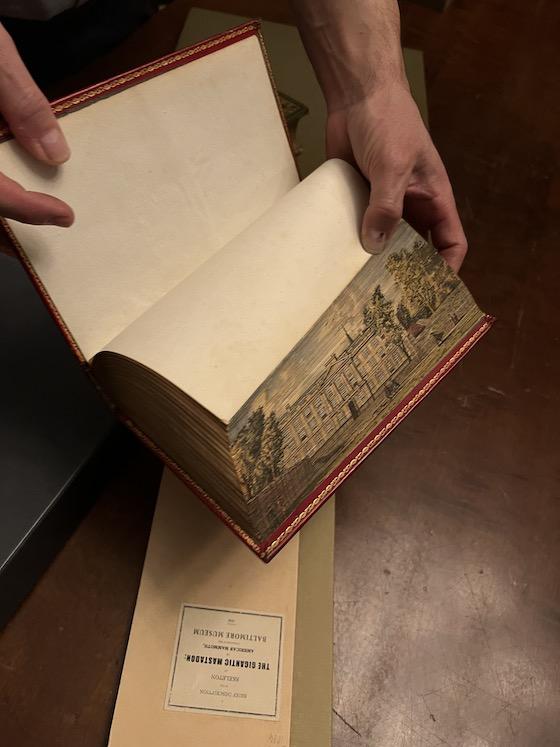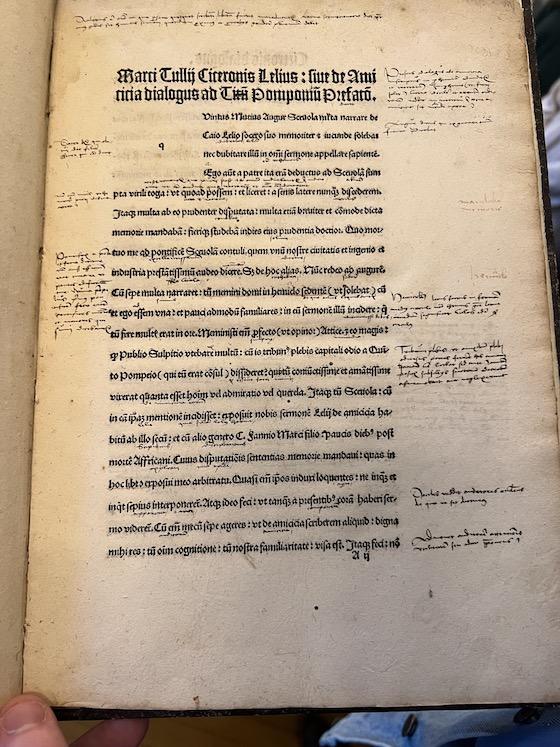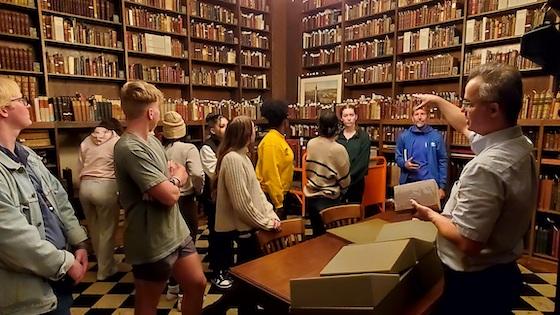Holding History in Your Hands

A group of Hood students and faculty gained firsthand access to the special collection of rare books and manuscripts at the Peabody Library in Baltimore, Maryland.
Hood Students Explore Rare Books at Peabody Library
Department
- Art & Archaeology
- Global Languages & Cultures
- History
These days, it’s easy to take the printed word for granted. The average smartphone user holds the wealth of human history and knowledge in their pocket. What once required months, even years of labor to write by hand is rendered digitally in a fraction of that time by machine. One-of-a-kind volumes that were scarcer than gold can be accessed instantaneously. Information that was kept carefully guarded by an elite few is now freely shared across the globe.
A group of Hood students witnessed this stark contrast during a trip to the George Peabody Library in Baltimore, Maryland, which is part of the Johns Hopkins University. Members of Professor Robert Casas’ Medieval and Early Modern Iberian and Spanish Literature course explored manuscripts, rare books and incunabula (the earliest printed books). As part of the class, students read works from the 13th-17th centuries. At the Peabody, these students got to handle actual books from these eras, some of which were more than 500 years old.
“This field trip allowed us to better understand the story of the book as an artifact,” says Casas. “The visit to the Peabody helped us discern the laborious process of producing these artifacts. Given the immediacy that characterizes our society, it isn’t easy to imagine the kind of patience and effort that were invested into creating these manuscripts.”
Before the invention of the printing press, bookmaking was no easy feat. First, the base material—paper, papyrus or velum (animal skin)—had to be sourced or manufactured. The text was then carefully handwritten and often embellished with illustrations before the pages were bound. Early printing presses streamlined the process but required similar dedication, as individual metal pieces for each letter had to be assembled and reassembled for every page. This is where the expression “mind your p’s and q’s” originates from, when those letters could become easily mistaken with movable type.
Students also learned about the political context in which early books existed. Knowledge is power, and since the dawn of the written word, people have tried to control and exploit that power. Books were rewritten, censored or outright banned for threatening the status quo. Religious authorities often suppressed any material deemed “heretical,” such as the writings of Copernicus that described how the earth revolves the sun.
As the technology evolved and printing presses grew more sophisticated, dissemination of books and pamphlets accelerated. With a well-informed and more educated public, it became harder to erase “dangerous” ideas. The historical consequences were immense. From the Protestant Reformation to the conquest of the Americas, world-changing events that still reverberate in our society can trace their roots to the printing press.
“The mass reproduction of printed works was a revolution that can be compared with the arrival of the internet,” says Casas. “It radically changed how knowledge was spread and preserved, lowered its production and distribution costs, and took the cultural monopoly out of the hands of a few, making it available to a larger group of people who could read.”
Hood students left the Peabody with a newfound appreciation for the books they carry to class every week. “Through this trip my classmates and I were offered a tangible opportunity to learn about both the creation of books and the importance they held,” says James Locke ’23, an arts and archaeology major. “By studying history, we are permitted a means of understanding how people in the past behaved and lived. By doing so, we are offered a degree of introspection of our own society and current events.”



Are you ready to say Hello?
Choose a Pathway
Information will vary based on program level. Select a path to find the information you're looking for!
